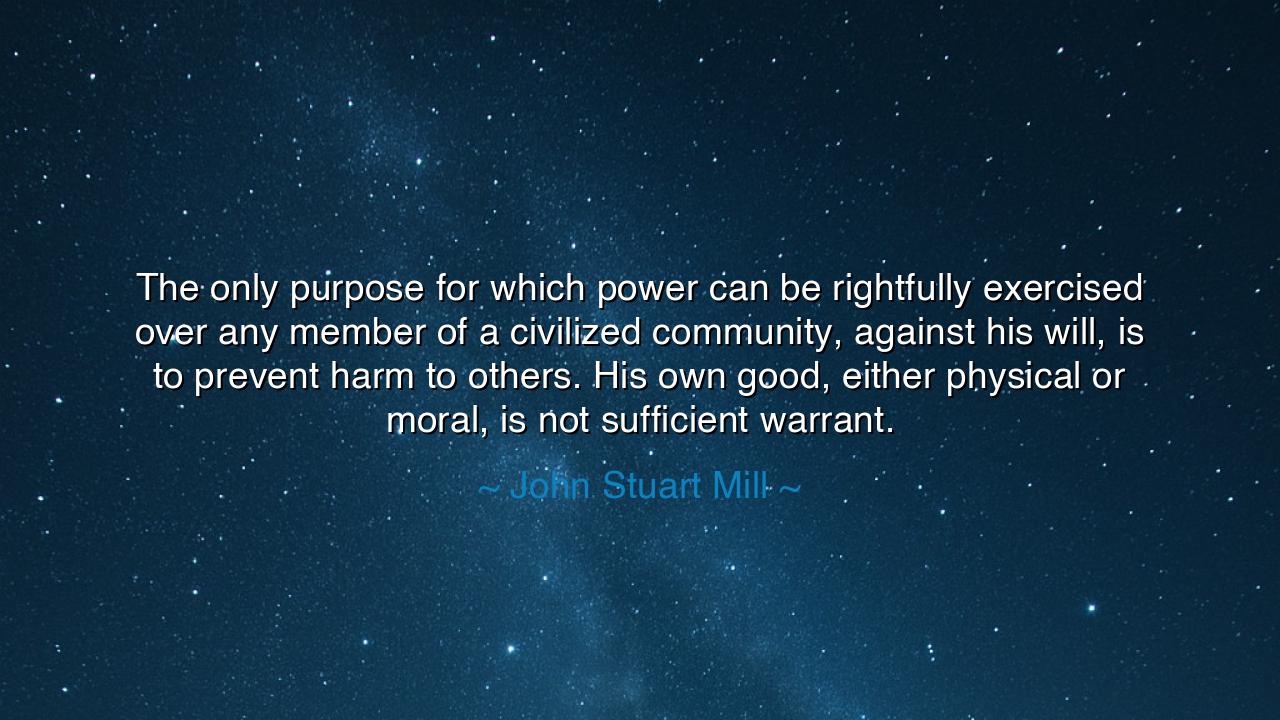
The only purpose for which power can be rightfully exercised
The only purpose for which power can be rightfully exercised over any member of a civilized community, against his will, is to prevent harm to others. His own good, either physical or moral, is not sufficient warrant.






Hearken, O children of reflection, to the profound counsel of John Stuart Mill, who spoke of the just limits of power in a civilized society. He declares that the only rightful exercise of authority over another, against his will, is that which prevents harm to others. Beyond this, the use of power to shape a man’s own good—whether physical or moral—cannot be justified. Here lies a teaching for the ages: liberty is sacred, and the restraint of one’s fellow must be measured, precise, and guided by justice, not by paternalistic desire.
The origin of this reflection is found in Mill’s seminal work, On Liberty, written in the mid-nineteenth century, a time when industrial, social, and political transformations demanded new conceptions of freedom and authority. Mill observed that governments, societies, and leaders often acted under the pretext of safeguarding individuals from themselves, imposing restrictions justified by supposed moral or physical benefit. He argued that such interference, though well-intentioned, erodes autonomy and suppresses the growth of character and reason.
The meaning of this aphorism is enduring and profound: liberty exists not merely as a privilege, but as a moral principle. A man’s freedom cannot be curtailed merely to advance his own welfare, for to do so is to deny the essential dignity of choice and judgment. Only when one’s actions threaten the safety, rights, or well-being of others does the use of power become just. In this, Mill provides a compass for governance, social interaction, and ethical reflection, reminding all that restraint of liberty carries grave responsibility.
History illuminates Mill’s teaching with clarity. Consider the abolition of slavery in the 19th century. Governments intervened to prevent the harm inflicted upon countless individuals, justifying the exercise of power against the will of the oppressors. Yet in other instances, rulers imposed laws “for the good” of their citizens—such as restricting personal habits or expression—which often stifled innovation, thought, and character without preventing harm to others. Mill’s principle draws a line between legitimate authority and overreach.
Moreover, this wisdom applies beyond politics to daily human relations. Parents, teachers, and leaders are often tempted to enforce behavior “for the good” of another. Mill teaches that guidance must be exercised with discernment, allowing autonomy unless the actions in question endanger others. True moral and civic education is not coercion, but the cultivation of judgment, empathy, and reason, safeguarding liberty while protecting society.
O generations yet to come, take this counsel into your hearts: power must be wielded with justice, limited by principle, and never in the name of paternal concern alone. Intervene only to prevent harm, and respect the sacred domain of choice and conscience. For it is in the balance of freedom and responsibility that a civilized community endures, and that the light of human dignity and wisdom shines undimmed across the ages.






PLPhu Le
I feel this quote emphasizes the ethical boundaries of power. How can society determine when intervention is truly to prevent harm rather than to enforce conformity or morality? I’m curious whether this principle has practical limitations, for instance, in cases where individuals make choices that indirectly affect others through social networks or economic systems. Could this philosophy guide modern debates about autonomy, governance, and the role of law in regulating both personal and collective well-being?
NHNhat Huy
This statement raises important questions about civil liberties. Does Mill suggest that coercion is justified only in cases where an individual’s actions directly impact others, not when society deems something morally wrong? I’m curious how this principle applies in complex scenarios, like environmental regulations or financial policies, where harm may be collective and diffuse. Could Mill’s framework offer a foundation for liberal democracy by prioritizing personal freedom while maintaining public safety?
NTtrn nhat thanh
I find this perspective thought-provoking because it distinguishes between self-regarding actions and actions that affect others. Could Mill’s principle help navigate debates on controversial personal behaviors, like substance use or risky recreation? I wonder whether the emphasis on preventing harm to others provides enough flexibility for nuanced legal and ethical decision-making. How do we balance protecting society while respecting individual autonomy, especially when the consequences of actions may be indirect or long-term?
TTTran Thanh Thao
Reading this, I feel challenged to consider the tension between individual freedom and collective safety. How do we define 'harm to others' in a way that justifies intervention without overreach? I’m curious whether Mill’s principle can guide policymaking in areas such as speech, personal choices, or public health. Does this mean that governments and institutions should refrain from imposing moral standards on citizens, even if those standards are widely accepted or beneficial in theory?
TLThuy Linh
This quote makes me reflect on the limits of authority and the ethical use of power. Does Mill imply that paternalistic laws or interventions are inherently unjust if they aim to protect individuals from themselves? I wonder how this principle applies to modern issues like mandatory health measures, drug laws, or lifestyle regulations. Could there be circumstances where preventing self-harm might indirectly protect society, and does that blur the line between personal liberty and social responsibility?